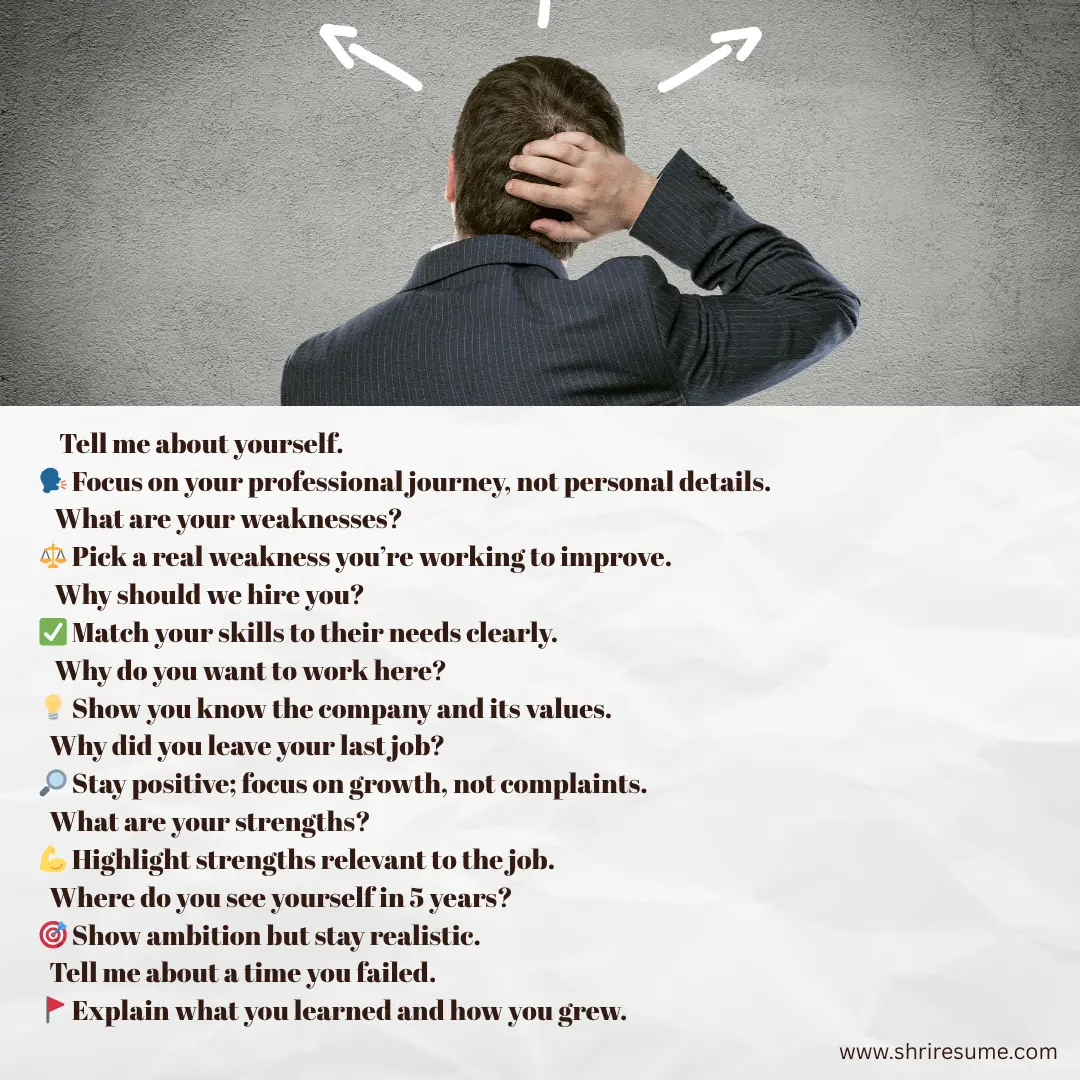Common Interview Questions in India with Best Answers (2025)

Whether you’re preparing for interviews at IT giants like TCS, Infosys, or Wipro, MNCs like Amazon or Google, or innovative Indian startups, thorough preparation is key. Indian interviews typically include HR rounds, technical rounds, and managerial rounds - each with their own set of common questions.
This comprehensive guide covers the most frequently asked interview questions in India with sample answers that will help you showcase confidence and land your dream job. Whether you’re a fresher preparing for campus placements or an experienced professional, these tips will help you succeed.
Would you like to have something before we begin?
This might sound absurd as a ‘job interview question’ and something more of interview etiquette, but psychologists say that if people want to do something for you, they do so because of some positive inclination towards you.
Technically known as the ‘Ben Franklin effect,’ this phenomenon suggests that a person is more likely to help you again, has he helped you earlier. This means, if asked for a glass of water, accept it even when you are not dying of thirst; at least for your own good sake!
Can You Tell Me Something About Yourself?
This question seems so simple yet people usually fail to pre-prepare its answer. However, it is to be remembered that this usually tends to be the very first job interview question and must be considered as important as other questions.
No matter how open-ended it appears, you should never take this time to self-analyze in depth; only because it is an interview question.
Rather, you should take it as a chance to pitch yourself. So, instead of giving complete employment or personal history, try to wind up within a minute, concisely mentioning your skills and accomplishments that will make you the best fit for the job in question. Conclude the answer by letting the interviewer know how your work experience makes you suitable for the role you have applied to.
Why Are You Interested in This Role?
Being a job seeker, you should answer this question by highlighting the positive aspects of the job and the growth opportunities it will bring to you to show your enthusiasm. There is no point iterating here your professional background and experience relevant to the job opening.
While answering, you should keep in mind that even if you are a perfect match (as you think), the rest of the interview session will be mostly about explaining the same. So, make the most of this time to reflect on your excitement about the job opportunity. Your sheer willingness to do certain jobs can make a difference.
Why do You Want to Work with This Company?
This is again quite a common interview question but a crucial one, especially if you have applied for a job that is quite conventional across various organizations. Therefore, you should prepare for it beforehand.
With this question, the hiring managers may want to find a broader understanding of your prospective employer. So, you must think from a hiring manager’s perspective as well as consider organizational goals. Answer to convey that you clearly understand the company’s vision and mission, corporate values and to some extent, its culture as well.
Try to make the interviewer feel good about his choice of being part of his/her organization and that you are excited to be a part of their workforce.
What Do You Know About the Company?
Although somewhat similar, a recruiter might ask this question too along with the previous one in the same interview. This is to explore how you really care about the position and the company, and also how much you are interested in knowing about the company.
While it is not the most crucial one, you should be well aware of the organization’s mission, milestones, and uniqueness. An interviewee should also consider different facets of the company’s business that are directly/indirectly related to the job opening or role you will be taking if hired.
For instance, look at all social media handles of the company in case you are going to be interviewed for a social media/content marketing position.
How Did You Learn About this Job Opening?
Do not make the mistake to consider it just another random/insignificant question. Instead, take it as a chance to show your keenness for the role and interest in the organization. Never hesitate to tell them that it’s your dream to work with the company and that you regularly follow its website; if that’s the case.
In case you came to know about the opportunity from any of the company’s existing employees, mention his/her name to build a positive connection. This could additionally help you create a lasting impression during the interview.
If the source is a job board, don’t just tell that you have been actively looking for a job and stumbled upon this opening. Specifically, explain to the hiring manager what compelled you to apply for the job.
Why Do You Want to Leave Your Current Job?
Never take this question as an opportunity to criticize your present employer or boss. Even if you have had a bad experience, revealing it might simply work against you. The question may appear differently, but its objective is to explore why specifically you are at that interview venue. So, answer accordingly by discussing things that made this job opportunity appealing to you.
No matter how tempting the question may seem to you, don’t utter anything that can make you sound discontented or frustrated.
What Are Your Strengths?

Yet another common interview question, but you must answer it in your unique way to create an imposing first impression in the job interview. Try to answer it in light of your career objectives and work experience.
You might be good at some sports, a great cook, or an amazing singer, but this is the time to discuss strengths at your workplace, i.e., professional strengths. Only pick 2-3 points and draft an answer that you think is likely to make you stand out as an applicant.
It is always better to explain each strength with appropriate examples.
Rather than simply saying that you are a team player, quoting a situation, wherein you managed to bring everyone on the same page when everyone had different views can be more impactful.
What Are Your Weaknesses?
You should well prepare in advance for your strengths as well as weaknesses. While discussing your strengths can’t be that tough, talking about your weaknesses can be nightmarishly difficult. The reason is that we think that we can’t answer this question honestly.
Hence, while prepping the answer, try to be concise and come up with positive examples of weaknesses. Yes, you can present weaknesses too in a good way, but only when you are honest and can appropriately explain how you are getting better.
In simple terms, just speak what is necessary, and keep in mind that you don’t need to explicitly share what you think your weakness is. The best way is to select a single weakness, typically an insignificant one. For example, you can discuss your aggressiveness in setting targets or your tendency to be impatient at times while working on a project.
Also, make sure that whatever you answer should revolve around the job opportunity you have applied to.
What According to You Is Your Greatest Professional Accomplishment?
Answering this question is an excellent way to show how you can contribute to the company. The best way to answer this common interview question is to explain the situation scrupulously but without revealing details that are not relevant to the job opening or seemingly not interesting to the hiring manager. It should be mostly about what you did and what you accomplished. If possible, present your achievements in figures to make them more noticeable and comprehensible.
How Would Your Co-Workers Describe You?
First of all, try to be honest as once you will be hired, the hiring manager will certainly be contacting your ex-boss and colleagues. Consider it as a chance to present your interpersonal skills and the ones that make you a great team player and motivator – some traits for which you have been admired by your manager or co-workers in your current or previous roles.
If you have a short story to narrate about how you led the team in times of adversity or kept motivated your team members during a tightly-scheduled project, go for it.
Do You Like Working in a Team or Independently?
This is one question that enables the hiring manager to see whether you will be a great fit for the work culture in general and the job in particular. Always tell the truth, but make sure to let the recruiter know that you are well adapted to work in both situations, depending on varied sorts of tasks assigned during the employment.
Employers usually want to hire people who are professionally and personally easy going but at the same time, they prefer employees who can manage things individually whenever required.
What Do You Do to Handle Stressful Situations?

This is usually a common interview question when you apply to highly stressful roles. The shortest possible answer to this is – ‘well,’ but you won’t be answering this for sure. Alternately, you are supposed to describe your competence and skills to handle stressful situations and intense work pressure.
The best way to do so is to share an experience, explaining how you easily and confidently maneuvered through a stressful situation while bringing about the desired outcome.
In general, for such roles, it is expected that you have chosen to serve such an industry/role at your discretion in the beginning. Also, when you apply to such job openings, hiring managers usually presume that you have gone through the job description (JD) thoroughly.
It is also assumed that you might have molded yourself to deal with work pressure effectively in your previous and current roles and that you are confidently ready for the new role, regardless of how much pressure it will bring to you.
Tip: Before applying for any job, thoroughly look at the JD and judge if the role suits you well in every aspect so that you do have relevant things to share during a job interview.
While Working on Multiple Assignments, What Do You Do to Keep Yourself on Track or Organized?
Companies prefer people who are organized and up-to-date. Discusses what approach you follow to manage multiple assignments and responsibilities at a time – whether you use a to-do list or calendar or make use of some organizational service or application.
Are You Comfortable Travelling for Work?

Here again, you need to be honest. If the job you have applied to requires you to fly or board a train once a week or month, be sure about whether you would be comfortable with such arrangements beforehand to ward off any unpleasant experiences after employment.
Hence, if your family or health doesn’t allow you to travel frequently, it is always a great idea to reveal it right in the interview. However, if occasional traveling (twice or thrice a year) is what you can easily manage, you should tell this too to the recruiter.
What Other Job Opportunities Are You Looking at Currently?
It’s not a great idea to reveal the names of organizations since no one would ever like hearing that you are simultaneously applying and interested in a company that is a direct competitor of theirs. That means this might work against you.
Alternately, if you say that you are not looking for an opportunity anywhere else, this might reflect that either you are lying, or you don’t realize your market worth and you are not confident enough to get a job in any other similar organization.
Thus, the best answer to this common interview question is to tell that you are looking for a similar challenging role in the same industry, where you can make a difference. You can also mention some common attributes of different jobs you are applying to, where you can make use of your critical skills.
Where Do You See Yourself in Five Years?
While you are expected to be particular and honest, you should remember that the hiring manager has put forth this question to learn – whether you are ambitious, have set realistic professional goals, and whether the job opening is in line with your goals.
Thus, answer this question while discussing how a current job opening can take you closer to your goals. What if you know that the job in question is not aligned with your professional aspirations? In such a case, you can simply say that presently you are unsure what the future has in store for you, but you are hopeful that this role can play a crucial role in setting career goals.
The answer might vary from person to person but going for a short vision statement works best.
What Is Your Dream Job?
This is just again a rephrased version of the previous question. The exact designation and role might not be what the hiring manager would have been expecting. Instead, the interviewer wants to decipher how the current job opening matches your career ambitions.
What Do You like to Do in your Free Time?
If you have a unique hobby, you can distinguish yourself from other interviewees by discussing briefly the same in a bit friendly manner instead of being too professional.
Nonetheless, if you don’t have anything particular to state, consider discussing activities that are related to your profession. For instance, if you are a programmer, you like to read about new technologies and learn new programming languages. Besides, you can also talk about your family and friends along with aspects that make you a wonderful human being.
What Kind of Work Environment Do You Prefer?
Hiring managers don’t prefer hiring people who are not comfortable with the work environment of their respective companies. This is because in case you are not able to adjust yourself, your work will suffer, which is not good both for you and the organization.
Do some research beforehand about the company’s work culture and environment, and answer accordingly. Remember that there is no point in applying to a company, whose culture doesn’t match your expectations.
What Management Style Do You Prefer?
‘Strong yet flexible’ is the exact phrase to define best managers. And, so you should reflect the same in your answer. Mention your moves that have helped your team members or the team on the whole. You can consider sharing anecdotes to prove your point, such as growing the team from 5 to 15 members or mentoring an underperformer, who later received the star performer award.
What Do You Consider Is Your Greatest Achievement in Your Last Job?
You know that you are perfect in your work, but you should mention something specific. So, keep a short story ready to narrate while answering this common interview question.
How Do You Think You Can Help This Company Grow?
In addition to exploring the company’s official website and social media accounts, think of your skills and expertise that can directly contribute to the company’s growth.
Describe a Situation When You Exercised Leadership?
Choose an example that presents your project management skills at their best – something that conveys how effectively and confidently you spearhead a team. However, it should also be relevant to the role you have applied to. Use enough details to make it memorable and believable.
Even if you are not in a managerial role in your present organization, discuss a situation when you took an initiative on your own or spearheaded a short-term project.
Mention Someone, You Admire and Why?
This question is usually asked to explore your side – your values and preferences. There is no fixed answer to this question. It can be someone you know personally or a celebrity. Just be genuine since it is completely pointless to predict what exactly could be the right answer from the recruiter’s perspective.
Remember that rather than the person itself, your reasons for admiring that person are important here. So, be careful not to reflect negativity of any sort with your reasons.
What Would Your Initial 30, 60, or 90 Days Look like in This Role?
This might seem illogical to you, but from an employer’s perspective, the question does make sense. The reason is that you will be hired to fill a gap in some department or team.
Begin by discussing things that you may require to ensure the company’s growth in your new role. This may include getting access to some additional information, being familiar with certain sections of the company, and discussing specific things with your colleagues.
Although you would be in a better position to answer this question, preparing an answer in advance would show your enthusiasm for the new job as well as how immediately you can immerse in the role.
Describe a Situation When You Made a Difficult Decision at Work?

Regardless of your designation in your previous or present company, you might have faced a difficult situation, wherein you had a tough time making a decision. It may be firing someone or confronting your boss over something that you don’t find worth considering.
This is the time to describe your reasons as this will showcase your decision-making and critical-thinking skills. Let the hiring manager know what aspects you had considered along with the pros and cons when making such a decision. This will reflect that you were completely aware of the repercussions of your decisions and you knew how to deal with them.
Describe a Conflicting Situation or Challenge You Have Faced at Work and How You Managed It?
This is another near-similar question, which explores your behavioral aspects. The intent here is to explore how professionally good you are at dealing with conflicting situations. Your answer should show be reasonable and reflect your confidence, stability, and calmness in managing the situation.
How Can We Do Better or Differently?
This is a typical startup interview question. Employers want you to think beyond their companies’ backgrounds and come up with new ideas that can contribute to organizational growth.
This may include ways to boost conversion rate, suggestions to improve customer support, or even tips to optimize operations. While preparing for the answer, use your expertise and critical thinking abilities to show your interest and reflect that you are a great fit for the job.
Why Are You Presently Unemployed?
Well, chances are rare that you would directly get this question. It is more likely to come to you as: “Tell me what made you leave your last job?”
A recruiter usually asks this question to investigate whether you are fired and if so, for what reasons! Today’s job market is pretty volatile, and people lose their jobs for reasons that have nothing to do with their performance and behavior. However, some people are sacked for valid reasons too.
So, irrespective of the reason for your job loss, try to create a story without defending yourself. The more reasonable and genuine you sound, the easier it would be for the hiring professional to move to the next question.
Are There Any Specific Reasons for Changing Jobs Frequently?
While the mean job tenure is constantly shrinking, that doesn’t mean that recruiters don’t bother about the same when hiring talents. A company invests a lot of time as well as money in every new employee and so, expects you to be stable and to show maturity with respect to career choices.
Nevertheless, you can give genuine reasons for such frequent job changes, where you were less at fault like a compulsion to be with the spouse, company shutdown, and so forth.
What Were You Doing During Your Employment Gap?
If there is an employment gap on your resume , i.e., you were doing something different from your regular job for a specific period of time in the past, be straightforward and upfront about the same. Tell the recruiter whether you were busy volunteering or engaged in some skill-enriching activity like enrolling in some course.
Thereafter, drift the conversation to show how your activities during the gap have helped you grow professionally. However, even if you don’t have anything great to mention, never try to mislead the hiring manager.
Recruiters don’t prefer to enquire much about the family, so if it was because of some family reasons, be honest during the interview.
Can You Explain Your Career Switch?
Don’t just be hopeless or give in to this question only because you don’t have a convincing reason to mention it. There is still a wonderful way to deal with such questions, but for that, you must do your homework.
Quote examples that reflect how your previous experience is transferrable to the new job, though you don’t need to establish a direct connection between the two.
Interestingly, you may even end up impressing the hiring manager if you prove your irrelevant work experience to be relevant to the new job to his satisfaction.
What Do You Prefer Reading?
While this may superficially seem to be a no-brainer, there is a hidden intent. This usually comes to you in the last phase of the session and explores your intellectual side.
So, if you haven’t sat with a good book for a long time, don’t feel bad. Just try to recall the last book you read or mention the one that you have read multiple times.
Is There Anything Else That Makes You the Right Candidate for This Job?
This common interview question is asked by many recruiters, no matter how unnecessary it appears to you. And, you know that you have to answer it too if it is thrown at you moments before wrapping up the session.
So, like other job interview questions, it is good to prepare for them in advance. Use a concluding pitch, describing how your motivation level and skills suit the job requirement and how your previous experience has perfected you for the job opportunity.
What Are Your Salary Expectations?
This is a crucial question in Indian interviews. Research salary ranges on platforms like Glassdoor, AmbitionBox, and Naukri.com for your role and experience level.
For Freshers: “Based on my qualifications and the current market standards for this role, I’m expecting a CTC in the range of ₹4-6 LPA. However, I’m flexible and open to discussing what your company offers for this position.”
For Experienced Professionals: “Based on my 5 years of experience in Java development and my current CTC of ₹12 LPA, I’m looking for a 30-40% hike, which would be in the range of ₹15-17 LPA. However, I’m also considering the overall package including learning opportunities and growth potential.”
Tips for Indian Context:
- Research CTC (Cost to Company) vs take-home salary
- Consider benefits like HRA, PF, gratuity, bonuses
- Be aware of industry standards (IT services typically offer 10-20% hikes, product companies may offer more)
- Don’t hesitate to negotiate - it’s expected in India
Do You Have Questions for Us?
A job interview shouldn’t be a typical interrogation session, only meant for the recruiter to see how well you are suited to the job. It is, in fact, an opportunity for you to explore if the job is as per your expectations.
No matter how tough it has been for you to answer all those predictable/unpredictable questions, you should keep a few questions ready for the hiring manager too. These could be related to the job-specific roles and responsibilities, the team you would be working with, your department, or the company as a whole.
This is also important because this shows that you are interested, excited, and curious about the new role. However, there is no hard and fast rule to asking questions just because you feel so. If it is a long session, you can simply move on by stating that you are more interested in being hired and that you find yourself a great match for the job.
Related Resources
Prepare for your interview with these helpful guides:
- How to Answer "Tell Me About Yourself"
- Master the STAR Method for Behavioral Questions
- How to Discuss Strengths and Weaknesses
- Best Answers to "Why Should We Hire You?"
- Video Interview Tips
Resume Samples for Your Industry:
Conclusion
Preparing for interviews at Indian companies requires understanding both technical and HR expectations. The questions discussed above cover the most common scenarios you’ll face at TCS, Infosys, Wipro, startups, or MNCs.
Key Takeaways:
- Research the company thoroughly before the interview
- Prepare STAR method answers for behavioral questions
- Practice with mock interviews - many coaching platforms offer this
- Be confident but humble - Indian interviewers value both
- Follow up with a thank you email after the interview
Use our resume builder to create an impressive resume that complements your interview preparation. With the right preparation, you can confidently answer any question and land your dream job in India.

Get a higher quality resume format
Our Resume Builder ensures best practices, logic, formatting standards and job matching opportunities from thousands of job boards and portals around the world.
By clicking Start Your Resume, Your are agree to our Terms of use and Privacy Policy
 India's
premier resume service
India's
premier resume service






